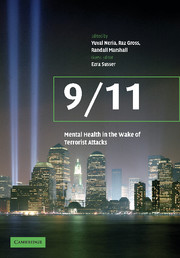Book contents
- Frontmatter
- Contents
- Acknowledgments
- Editors brief bio
- List of contributors
- Foreword
- Part I Introduction
- Part II The psychological aftermath of 9/11
- 2 Preface
- 3 Post-traumatic stress symptoms in the general population after a disaster: implications for public health
- 4 Coping with a national trauma: a nationwide longitudinal study of responses to the terrorist attacks of September 11
- 5 An epidemiological response to disaster: the post-9/11 psychological needs assessment of New York City public school students
- 6 Historical perspective and future directions in research on psychiatric consequences of terrorism and other disasters
- 7 Capturing the impact of large-scale events through epidemiological research
- 8 Mental health research in the aftermath of disasters: using the right methods to ask the right questions
- Part III Reducing the burden: community response and community recovery
- Part IV Outreach and intervention in the wake of terrorist attacks
- Part IV A New York area
- Part IV B Washington, DC
- Part IV C Prolonged-exposure treatment as a core resource for clinicians in the community: dissemination of trauma knowledge post-disaster
- Part V Disasters and mental health: perspectives on response and preparedness
- Index
2 - Preface
from Part II - The psychological aftermath of 9/11
Published online by Cambridge University Press: 27 October 2009
- Frontmatter
- Contents
- Acknowledgments
- Editors brief bio
- List of contributors
- Foreword
- Part I Introduction
- Part II The psychological aftermath of 9/11
- 2 Preface
- 3 Post-traumatic stress symptoms in the general population after a disaster: implications for public health
- 4 Coping with a national trauma: a nationwide longitudinal study of responses to the terrorist attacks of September 11
- 5 An epidemiological response to disaster: the post-9/11 psychological needs assessment of New York City public school students
- 6 Historical perspective and future directions in research on psychiatric consequences of terrorism and other disasters
- 7 Capturing the impact of large-scale events through epidemiological research
- 8 Mental health research in the aftermath of disasters: using the right methods to ask the right questions
- Part III Reducing the burden: community response and community recovery
- Part IV Outreach and intervention in the wake of terrorist attacks
- Part IV A New York area
- Part IV B Washington, DC
- Part IV C Prolonged-exposure treatment as a core resource for clinicians in the community: dissemination of trauma knowledge post-disaster
- Part V Disasters and mental health: perspectives on response and preparedness
- Index
Summary
The visibility and the political import of the collapse of the World Trade Center Towers made it an extraordinary event even in a world replete with disasters and wars. These massive buildings symbolized the financial center of the world. Their dramatic collapse was witnessed directly by millions of people in New York City, and indirectly on television by countless others around the globe. Thousands died, tens of thousands narrowly escaped death, and the effects rippled across communities of a wide region.
The chapters in this part of the book are concerned with the way in which this event affected the mental health of people in New York City and elsewhere in the USA. The authors of three key studies of the mental health effects describe the way in which their research was conceived and executed, and some of their most striking results. Leading psychiatric epidemiologists were invited to critique these studies, and comment more generally on the nature of research on mental health effects of disasters. In addition, one of the study authors was invited to respond to the critiques. We are indebted to all of the authors for their contributions.
By design, therefore, the chapters present divergent viewpoints about the nature and the magnitude of the mental health effects of September 11th. This approach results in a lively exchange, and enables readers to appreciate the ongoing debate and form their own opinions about it. But readers also have a right to know what the editors perceive to be the main lessons of this work. We will highlight five which have clear implications for future studies of the mental health effects of large scale terrorist attacks and other disasters.
- Type
- Chapter
- Information
- 9/11: Mental Health in the Wake of Terrorist Attacks , pp. 17 - 18Publisher: Cambridge University PressPrint publication year: 2006

